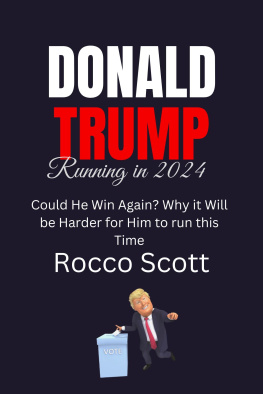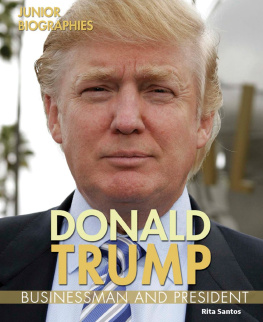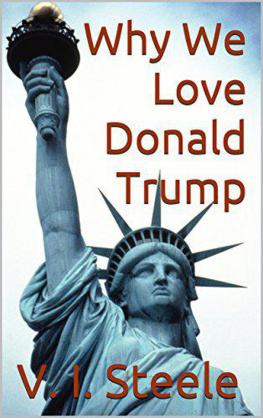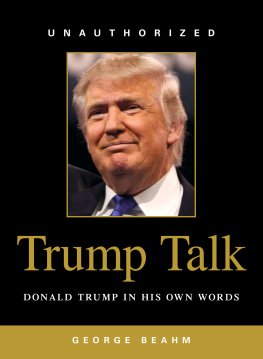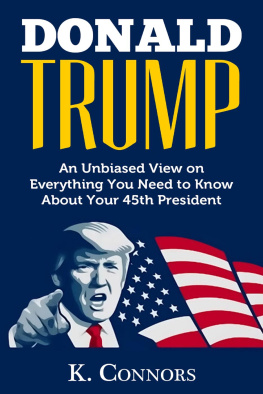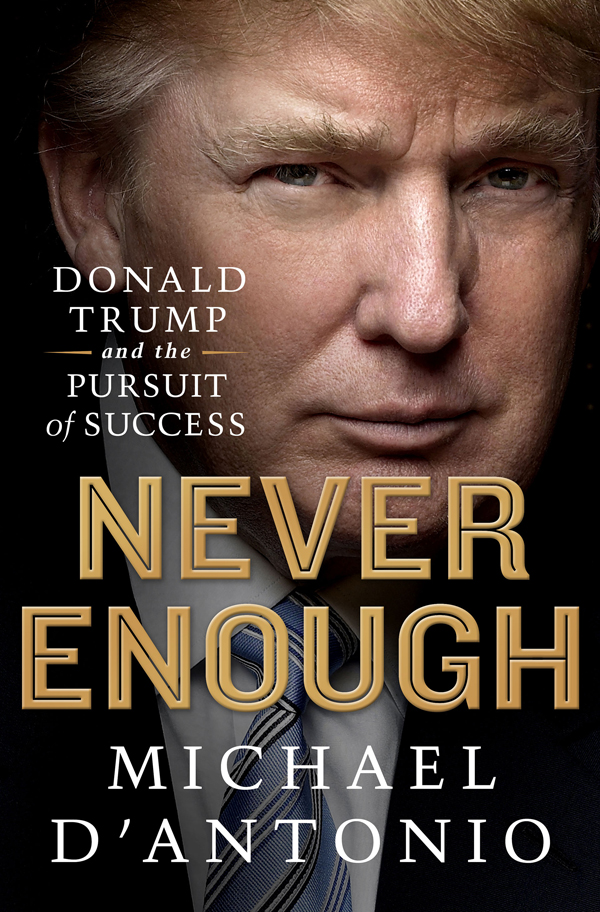Contents
Guide

The author and publisher have provided this e-book to you for your personal use only. You may not make this e-book publicly available in any way. Copyright infringement is against the law. If you believe the copy of this e-book you are reading infringes on the authors copyright, please notify the publisher at: us.macmillanusa.com/piracy.
For Toni
For the most part, you cant respect people because most people arent worthy of respect.
DONALD TRUMP
In profile, which was how TV viewers saw him that night, Donald Trump resembled nothing as much as a rooster in a tuxedo. His posture, developed in military school, was firmly erect. His eyes were focused, with narrowed intensity, on a distant challenger. And arcing from his forehead back to his neck, his famous helmet of golden hair evoked the cockscomb of a Rhode Island Red. For the rooster, this beacon is meant to attract female attention and warn off enemies. For Trump, who sat among admirers and detractors at the 2011 White House Correspondents Dinner, it drew the television camera that caught his reaction to the public ridicule heaped on him in the name of entertainment, by both comedian Seth Meyers and the president of the United States.
The only hint that Trump was suffering came as Meyers mocked him for a full two and a half minutes. As the people laughed and strained to catch a glimpse of Trump, he leveled a look that could kill at the comedian. His face remained unmoving, and glowering, as even the diners at his own table found themselves unable to resist the tide of laughter. Meyers revealed the reason for all the derision when he spoke of a poll that found that only 38 percent of Americans were certain the president had been born in the United States. Since the Constitution requires that presidents be native born, the issue, which had been manufactured by conspiracy theorists, was a blatant attempt to paint Obama as an other whose claim to office was illegitimate.
Through his long, strenuous effort to promote this birtherism, Trump had made himself a target of those who believed this talk was divisive, destructive, and perhaps a veiled form of racism. He objected to this criticism, insisting that he was not prejudiced and that he was posing important questions. When it comes to racism and racists, Trump said, I am the least racist person there is.
When it was his turn to address the White House correspondents and their guests, the president confronted the birthers head-on, but with remarkable humor, even presenting a video clip borrowed from the animated movie The Lion King as my official birth video. Obama then mentioned Trump by name, praising the leadership he had demonstrated while performing as host of a reality TV show and making the kinds of decisions that would keep me up at night. Obama added that with the birther issue resolved, Trump could get back to focusing on the issues that matterlike, did we fake the moon landing?
Confronted by a critic who stood rungs above him in the status hierarchy, Trump did not offer the killer stare. Instead he allowed the corners of his mouth to turn up, ever so slightly, which deepened the crows-feet that framed his eyes. He then offered a wave to the president. Trump could take a joke. Afterward he took pains to seem unperturbed and spoke as if he had achieved something by gaining the presidents notice. I was actually very honored by the way I was treated, said Trump. They treated me with great respect. They joked and they clowned, but I was the topic of conversation and thats perhaps not so bad.
In one way or another, Donald Trump has been a topic of conversation in America for almost forty years. No one in the world of businessnot Bill Gates, Steve Jobs, or Warren Buffetthas been as famous as Trump for as long. First associated with high-profile real estate development in 1970s Manhattan, his name soon became synonymous with success defined by wealth and luxury. Placed on skyscrapers, casinos, and commercial airliners, the name TRUMP (usually spelled in gold-colored, capital letters) became a true personal brand that connected one man to a seemingly endless number of offerings. In time it would be stamped on hotel rooms, furniture, neckties, meat; almost anything that might be sold as high quality, high cost, and high-class.
The kind of class Trump sought to deliver was defined not by social standing but by cash. Eagerly catering to the nouveau riches and the aspiring, he dismissed those who belonged to what he called the lucky sperm club while glossing over that he had been born into one of the wealthiest families in the country. Trump cast himself as the everymans rich friend, who shunned high society, except when it was helpful to sell expensive apartments. In such cases he dropped the role of the anti-snob and readily referenced the Astors, Whitneys, Vanderbilts, and other blue bloods of a bygone age. It was understood, however, that he brandished these names out of commercial interest and that his heart was really aligned with Middle America. These were the people who followed him on TV, bought his products, and might even give him their votes should he ever get off the fence and actually run for office.
Today, according to the best available data, 96 percent of Americans recognize the name Donald Trump, but most dont like him. Henry Schafer of the firm that defines celebrities with its Q Score ratings called Trump the quasi-celebrity people love to hate. In 2014, 61 percent of those polled in Trumps hometown of New York City viewed him unfavorably. Comedians find him an irresistible target. Jon Stewart, the former host of the long-running satirical news program The Daily Show, routinely jabbed Trump, calling him, among other things, Fuckface von Clownstick. The television host and comedian Bill Maher famously offered Trump $5 million if he could prove he wasnt the spawn of his mother having sex with an orangutan.
The level of commentary offered by Stewart and Maher says much about the rancor of our age. Its hard to imagine Mark Twain requiring the censors bleeps that accompanied Stewarts rants. Of course Twain may never have met anyone quite like Trump. Gleefully aggressive, Trump looks for opportunities to take offense and then wrestle a supposed enemy into the gutter. When Stewart offered a generic juvenile taunt, Trump replied in a deeply personal way, asking, If he is so above it all & legit, why did he change his name from Jonathan Liebowitz? He should be proud of his heritage! Jon Stewart @TheDailyShow is a total phony. He should cherish his past, not run from it. After Mahers comment, Trump filed a $5 million lawsuit. Although he eventually dropped it, the filing required a courts attention, at taxpayer expense, and a defense by Maher.
But even as he appeared appeased his critics, Trumps views and bully persona made him exceedingly popular with people who believed he represented important ideals, especially the American promise of success represented by great wealth. His image was amplified as he hosted a TV game show The Apprentice and maintained a constant presence on the social media site Twitter, where millions followed his commentary and many implored him to seek the presidency.
Ever provocative, Trump gained attention by expressing raw and unrefined thoughts rather than nuanced reflections. In his calculation, honesty comes from the corner of his heart that is willing to fling insults and divide the world into enemies and friends. As veteran gossip columnist Liz Smith sees it, Trump is often ruled by the needy child who resides in his psyche and would rather get negative attention than be ignored. Of course Trump does profit financially as he gives this part of himself free rein, and he has little patience for reflection or analysis. He just presses on, defying science with his criticism of immunizations for children and battling against the facts on climate change.




